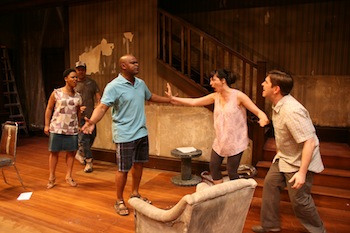Mirvish presents Studio 180’s Clybourne Park at Toronto’s Panasonic Theatre
When I was a kid my family would drive down to Toronto once a year to visit my aunt and uncle in Leslieville. On a stretch of Queen Street east of the Don River literally on the wrong side of the tracks; back then Leslieville was a run-down, working-class, immigrant ghetto. Nowadays, several of my comfortably middle-class, mostly white friends are flocking to the rapidly gentrifying neighbourhood and I only go to check out trendy new brunch spots as my aunt and uncle have since retired to the more comfortable climes of Markham.
Playwright Bruce Norris’ Clybourne Park is an exploration of the evolution of neighbourhoods and an examination of the phenomena of white flight and gentrification. Inspired by the 1959 Broadway play A Raisin in the Sun, Clybourne Park is one of the most lauded plays in recent history having won the 2012 Tony Award for Best New Play and the 2011 Pulitzer Prize for Drama.
I was disappointed to have missed Studio 180 Theatre’s Toronto premiere production last year at the Berkeley Street Theatre so I was thrilled to see it remounted at the Panasonic Theatre as part of the Off-Mirvish second stage series.
Norris’ script is sharp and witty social satire. It’s insightful and chock-full of pithy observational humour. The story takes place in a house in Chicago’s Clybourne Park neighbourhood and spans two generations. The first half takes place in 1959 as a neighbour confronts an aging couple for their decision to sell the house to a “negro” family.
The second act takes place in the same house fifty years later in 2009 as a white couple is trying to tear down and re-build the house in the now predominantly black neighbourhood. They are met with resistance and a petition from neighbours worried about how their plans would destroy the character of the community.
I really love the many parallels between the two acts. In the first act the characters’ interactions are stilted by this faux veneer of genteel civility commonplace in the ‘50s whereas in 2009 the characters find themselves navigating the tricky waters of political correctness.
The strong ensemble cast delivers superb performances. Michael Healey is a standout in the first act for his performance as Russ, the temperamental owner of the house mourning the recent loss of his Korean war veteran son to suicide. In the second act Kimwun Perehinec’s performance as Lindsey, the pregnant, exasperated, yet oddly diplomatic would-be owner of the house is a highlight.
Director Joel Greenberg infuses Norris’ smart script with a great sense of flow and pacing inserting the uncomfortable pauses in all the right places but something did seem a little off for me on opening night. While I thought the script was smart and funny and the performances were excellent I didn’t feel as though the show was hitting the right energy level and I think the venue might have been a barrier.
I wish I had seen Clybourne Park in its initial run at the Berkeley, I suspect the production would play better in a smaller venue allowing better proximity to the performance. The Panasonic Theatre is large enough that the actors need to wear mics and despite the valiant effort of sound designers Lyon Smith and Michael Laird, the acoustically unforgiving house resulted in a flat-sounding mix that I found mildly distracting.
That quibble aside, I highly recommend Clybourne Park for its smart, funny, relevant script and strong ensemble performances.
Details:
- Clybourne Park is playing till March 3, 2013 at the Panasonic Theatre (651 Yonge Street).
- Shows run Tuesday to Saturday at 8:00 p.m., Saturday and Sunday at 2:00 p.m. and Wednesday at 1:30 p.m.
- Tickets $45-$79. Students Tickets $20 (for all performances except Saturday evenings). Rush Seats $20, available day-of, in-person at Panasonic Theatre box office.
- Tickets are available in person at any Mirvish theatre box office, by phone at 416-872-1212 or online at Mirvish.com.
Photo credit:
– Photo of Audrey Dwyer, Michael Healey, Sterling Jarvis, Kimwun Perehinec and Mark McGrinder by John Karastamatis

